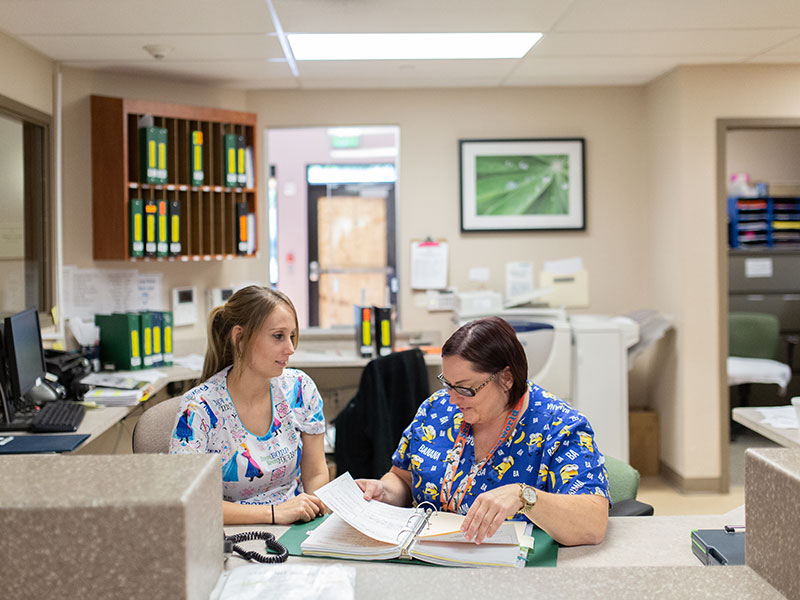Cedar Crest Hospital & Residential Treatment Center helps individuals who are struggling with depression find long-term recovery. Located in Belton, TX, Cedar Crest is the leader in mental health care.
Depression Treatment
Learn more about depression treatment at Cedar Crest Hospital & Residential Treatment Center in Belton, TX
Living with depression can make even the most cheerful moments tinged with grey and filled with unhappiness. If you’re living with untreated depression, you probably have a hard time mustering up enthusiasm about much of anything – even the things that once brought you tremendous joy. Feeling like a burden to others, you may isolate yourself, spending increasing amounts of time at home alone, avoiding friends and family, so that you don’t “bring them down,” too. You may find it hard to get out of bed to go to work or school, even though you know you need to in order to keep your job or your grades up. What’s worse, you know life wasn’t always like this – you were once happy, able to fulfill your daily responsibilities and able to balance your life. If you’re dealing with depression, your mood may sink so low, you may feel so useless that you wonder if it’s even worth it to try and bother getting help.
At Cedar Crest, a hospital for depression treatment in Belton, we understand that while depressive disorders are an incredibly common mental illness, many people are afraid to admit how they’re feeling. Our tender and compassionate staff has helped many children, teens, adults, senior adults, and military personnel struggling to overcome their depression through a combination of medication and individual, group, and family therapies. At our treatment center, we are proud to go the extra mile to work with families and their referral services to meet and exceed their admission, treatment, and discharge needs. We’re ready to take our knowledge and help you learn to lead the life you deserve.
How to Help a Loved One
Helping a loved one get treatment for depression
When someone you love is affected by depression, it affects everything, including you. No matter how often you reassure your loved one that you’re there for them, that they should seek help, that you love them no matter what, it seems like they’re simply not listening. They may push you away, convinced that you’d be “better off without them.” You know this isn’t the case and you’re probably struggling mightily with your own feelings about your loved one’s depression. Here are some tips for gently guiding your loved one into treatment for depression:
Acknowledge that depression is affecting you, too: When someone we love is struggling with feelings of depression, it can be very challenging to watch. You hate to see them struggle, but you may feel frustrated that he or she isn’t accepting your offers of help. You’re probably tired of being pushed away. You probably feel helpless. What’s most important is to practice proper self-care: find a therapist who specializes in depression and a local area support group to join for those who love people with depression. You’re entitled to all of your emotions – work through them so you can remain objective.
Do your homework: Limitless information about depression and its treatments is available to you. Take the time to research depression so that you can see the world through your loved one’s eyes – this can help you empathize with the way he or she feels. Find a treatment center that specializes in depression treatment and make an appointment with your loved one to tour the facility and ask any questions you have about their approach to depression treatment.
Be gentle but persistent: This is one of those times that it’s okay to be pushy – if you can do it in a gentle manner. You know that he or she needs help, you know depression is a highly treatable illness, and you know that he or she cannot continue living like this. Gently guide your loved one into treatment at an inpatient facility that has countless years of experience treating people who have depression. Above all, refuse to give up on your loved one.
Why Consider Treatment
Why consider treatment for major depression disorder at Cedar Crest Hospital & Residential Treatment Center in Belton, TX
If you’ve been living with untreated depression, you’re probably aware of the effects it is having on your life, as you lose more and more of your ability to successfully meet your responsibilities. You may have been put on academic probation and threatened with expulsion if you don’t get your grades up. Your boss may have grown so weary of your tardiness, absenteeism, and poor work performance that you’re on the verge of losing your job. Your personal relationships may have suffered as you’ve grown increasingly isolated, always pushing those who love you away. You may have begun to hurt yourself to express some of the emotional pain you’re feeling and you may even have begun to consider ending your own life. Help is available – you no longer have to live like this.
Inpatient treatment for depression can change your life for the better. Through such treatment, you’ll have physicians and nurses who may use medications to treat depression and the symptoms, such as anti-depressants, while being monitored 24 hours a day for medication reactions and safety. You’ll learn the coping skills needed to get through this tough time and learn to face the world with renewed faith that things will improve. Inpatient treatment will allow you to escape the stresses of daily life and devote all of your time and energy on the one thing that matters most – recovering. This treatment can help you gain control over your depression and begin to live life once again.
Our Philosophy
Cedar Crest Hospital & Residential Treatment Center philosophy and benefits
Nestled on a 30-acre campus in the gorgeous rolling hills of central Texas, Cedar Crest, a depression treatment center in Belton, is proud to offer innovative psychiatric and substance abuse treatment for children, teens, adults, senior adults, and military personnel in a serene environment that promotes recovery and healing. For over 30 years, our hospital for depression has served and treated thousands of people and families who come to us for the nationally-recognized depression care we provide. Our treatment center offers a full continuum of care for those struggling with depression, including inpatient care, longer-term residential care, partial hospitalization programs (PHP), and traditional outpatient therapy services.
Types of Treatment
Types of depression treatment offered at Cedar Crest Hospital & Residential Treatment Center in Belton, TX
When you first come to us for help treating your depression, you’ll undergo several evaluations that will allow us to form a better picture of your challenges. The medical examination will rule out any medical reasons for your depression (such as hypothyroidism) while the psychiatric evaluations will determine the severity and type of depression as well as the presence of any co-occurring mental health disorders. Your multidisciplinary treatment team will then work with you to create an individualized plan of care for your stay with us that meets all of your needs.
Medication is often used in the treatment of depression. Some people do go on short-term medication therapy for depression and are slowly weaned off these medications as they learn more adaptive coping skills. Most others, however, will require medication maintenance to decrease the symptoms of depression and allow them to fully engage in their recovery.
Individual therapy allows you the chance to work privately with a therapist who specializes in depression treatment. Our therapists will work with you to identify any negative thought patterns you may have and replace them with more appropriate ways of viewing the world. You’ll also focus upon solutions to the challenges depression has caused in your life.
Group therapy is a very important part of care for people who are depressed as it allows you the much-needed social interaction and support by people who understand depression. Together, you’ll work toward growing, learning, and healing in our groups. We offer groups focusing upon coping skills, importance of medication, life skills, and recognizing and preventing depression relapse.
Family therapy is vital to your recovery as your loved ones can provide the cornerstone for your support system once you leave our treatment center. Your loved ones will continuously be involved in your care, and we’ll use family sessions to educate your loved ones about ways they can help in your recovery. We encourage your family to visit at least twice a week, however your loved ones can come every day if they choose.
As our depression treatment center aims to treat the whole person, you’ll engage in experiential treatments that accompany our scientifically-validated therapeutic treatment. These experiential treatments may include:
- Yoga
- Art
- Swimming pool
Continuing Care
Continuing care and levels of treatment for depression
Our hospital for depression in Belton, TX, is proud to offer a number of treatment options designed to help all those struggling at the level of care they need. Even after your stay with us, we are available 24/7 to offer a helping hand. When it has been determined that you no longer require the structure of inpatient treatment, you and your loved ones will meet with a social worker to discuss your continuing care options. We will provide you with information about local support services, help you cope with the transition out of inpatient treatment, and help create continued treatment goals with you to ensure continuity of care and treatment. You may opt to step down into a structured outpatient treatment option such as an Intensive Outpatient Program (IOP) or Partial Hospitalization Program (PHP), both of which will allow you to focus on your recovery during the day while returning to your home in the evenings. If you feel you’ve made enough progress during your stay, we can refer you to our traditional outpatient therapy clinic to help coordinate your plan of care post-discharge. At our treatment center, we’ll always go the extra mile for you and your loved ones.

















